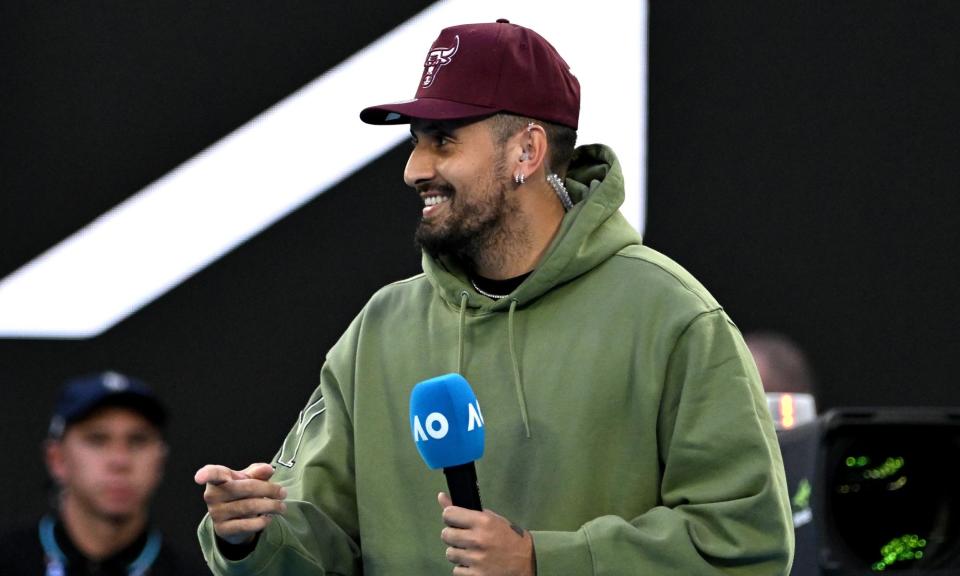Nick Kyrgios represents modern Australia – it’s time we grew up and embraced him

It’s lamentable that Nick Kyrgios feels the people of this country don’t want him representing them, because he very much does represent modern Australia.
Despite spending much of his career battling racism and doubters, Kyrgios remains hugely popular among many Australians. That was clear on Tuesday night, when the Melbourne crowd, egged on by world No 1 Novak Djokovic, roared its approval of the tennis star, who was born in Canberra to a Greek father and Malaysian mother.
Kyrgios had emerged to hold the post-match interview with Djokovic, but the Serb quickly took charge of the situation. Ignoring the first question, Djokovic turned to the crowd, mic in hand.
“We miss Nick! Come on guys, show him some love!”
Related: Nick Kyrgios says his ‘time in the sport may be over’ due to tennis injuries
The crowd exploded, and Kyrgios almost looked a little embarrassed. It was a sweet moment between two men who have never felt as universally embraced as they believed they should be.
And while Kyrgios continues to recover from his injuries, which have kept him out of tennis for around a year, I hope he thinks about that moment.
In his recent opinion piece published in the Nine newspapers he considers an early retirement due to the injuries, and laments that his desire to represent Australia has diminished in recent years.
“I wanted to play for my country, I can’t say that I still have that desire. And let’s be honest, I haven’t exactly felt like Australia has wanted me to represent it either.
“I’ve said before, I often feel more at home away from home.”
And it is hard to fault him for feeling that way, having told Men’s Health only last year that he has dealt with “bad racism” in his life.
“Australia is a pretty racist country in general, one of the most racist countries in the world,” he said.
“Some of the most iconic people in sport in Australia have told me and my family to go back where we came from and this kind of bullshit. Stuff that isn’t acceptable, not acceptable at all.”
This is all ultimately very sad, predictable and relatable for young men from ethnic backgrounds.
Accusations of arrogance, stubbornness, aggressiveness or brutish behaviour are often directed at young men from migrant backgrounds. These are all rooted in racist images of crude, uncivilised, foreign men.
And it’s boring to hear these lazy tags trotted out when Kyrgios takes to the court. Passion on the court should be celebrated, not censored.
To me it shows he cares, that he is deeply involved in the moment, not detached and diluted by media training. Often his behaviour is also funny. His quick wit should be welcome in what can be a very stilted sport.
Ultimately the negative perception of his confidence comes from a biased view of ethnic men, many of whom feel comfortable seeing it on screen and don’t misinterpret it as arrogance.
You can see the same confidence on soccer pitches and basketball courts across western Sydney, in heated Fifa video game matches inside homes and during group chat roasting sessions online between friends.
It was always a delight to see that same kind of cheeky behaviour on the tennis court.
Kyrgios represented all the boys I grew up with, men who learned to bite their tongues in professional settings, who hide their large personalities for fear of being misinterpreted. He was setting an example – a man from a migrant background showing others like him they shouldn’t have to hide who they are.
His hoodies and bright cars, his passionate defence of himself, his caps and his chains, all felt so familiar.
Kyrgios represented me, and my own journey towards embracing my Lebanese background as important and celebrated parts of who I am.
And the criticism of Kyrgios, the focus on his perceived arrogance or his aggression, represents an old Australia, afraid of change and afraid of these boys.
The fact that many sections of Australia, including the media, rejected Kyrgios suggests the country is not yet ready to deal with the new Australia.
Nearly half of Australians have a parent born overseas, and more than a quarter were themselves born overseas. All indications point towards a growing multiculturalism across the country.
And that means there will only be more sports stars who come from migrant backgrounds like Kyrgios in the future – it’s time Australia grew up and embraced them.

 Yahoo Sport
Yahoo Sport 





































